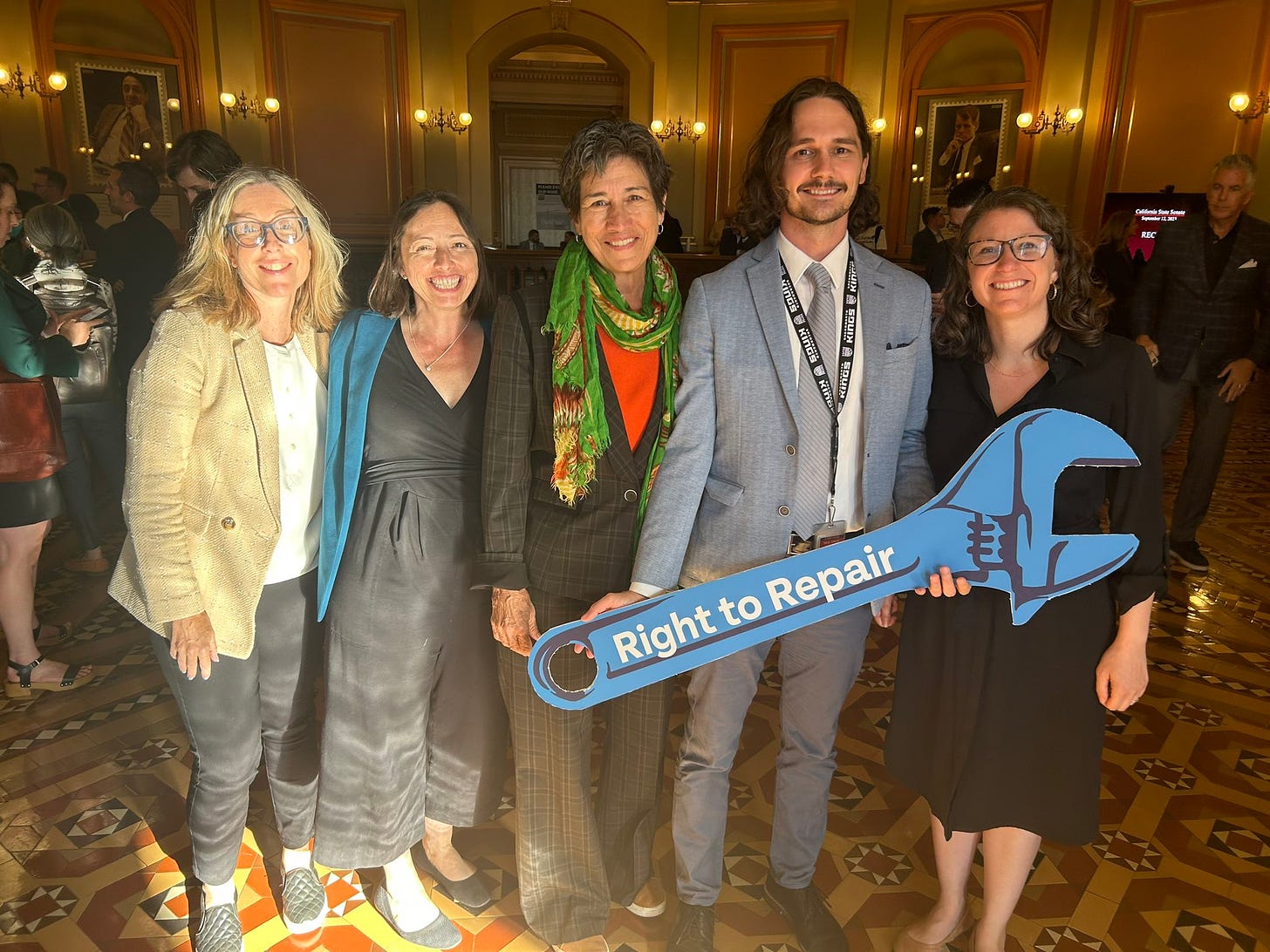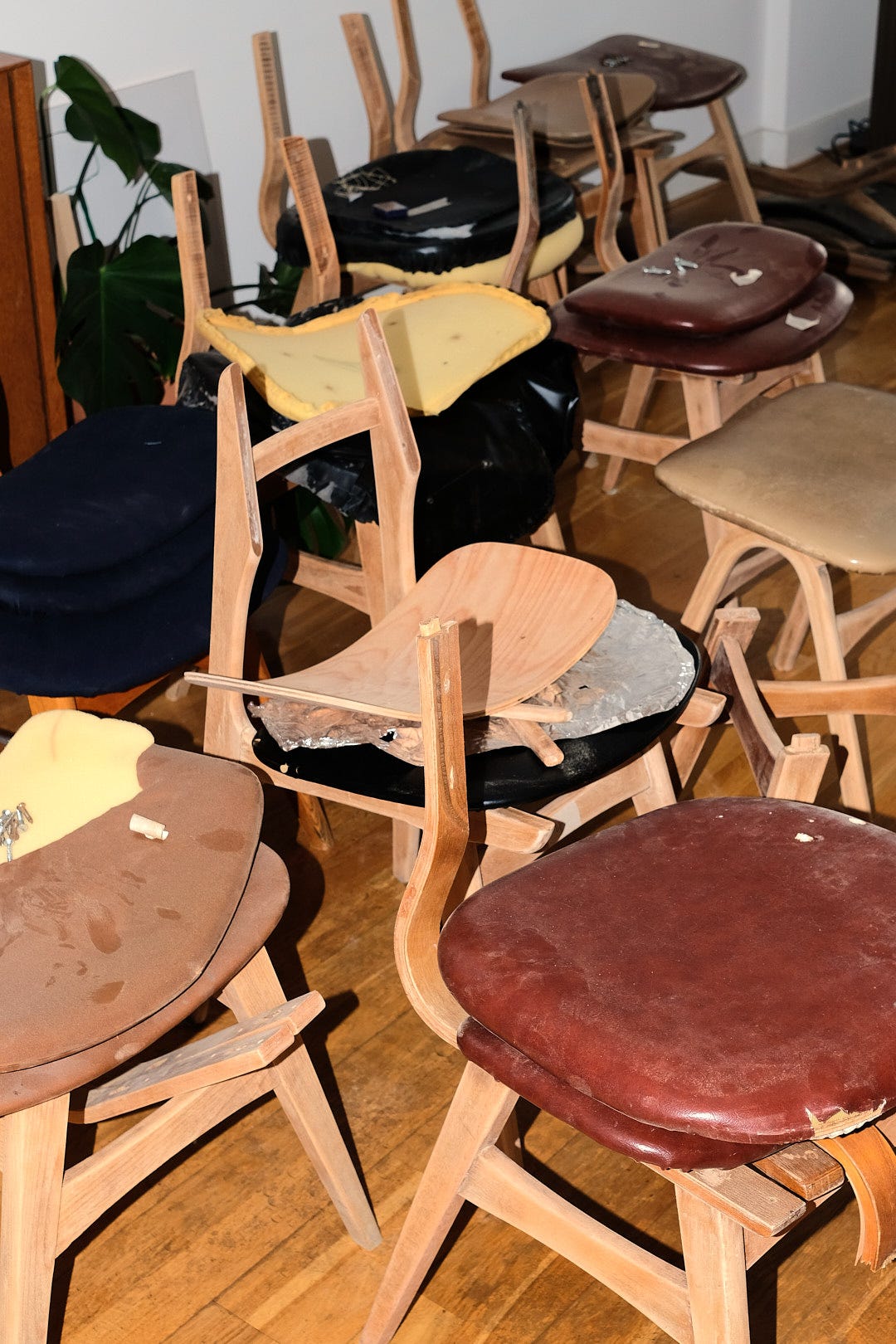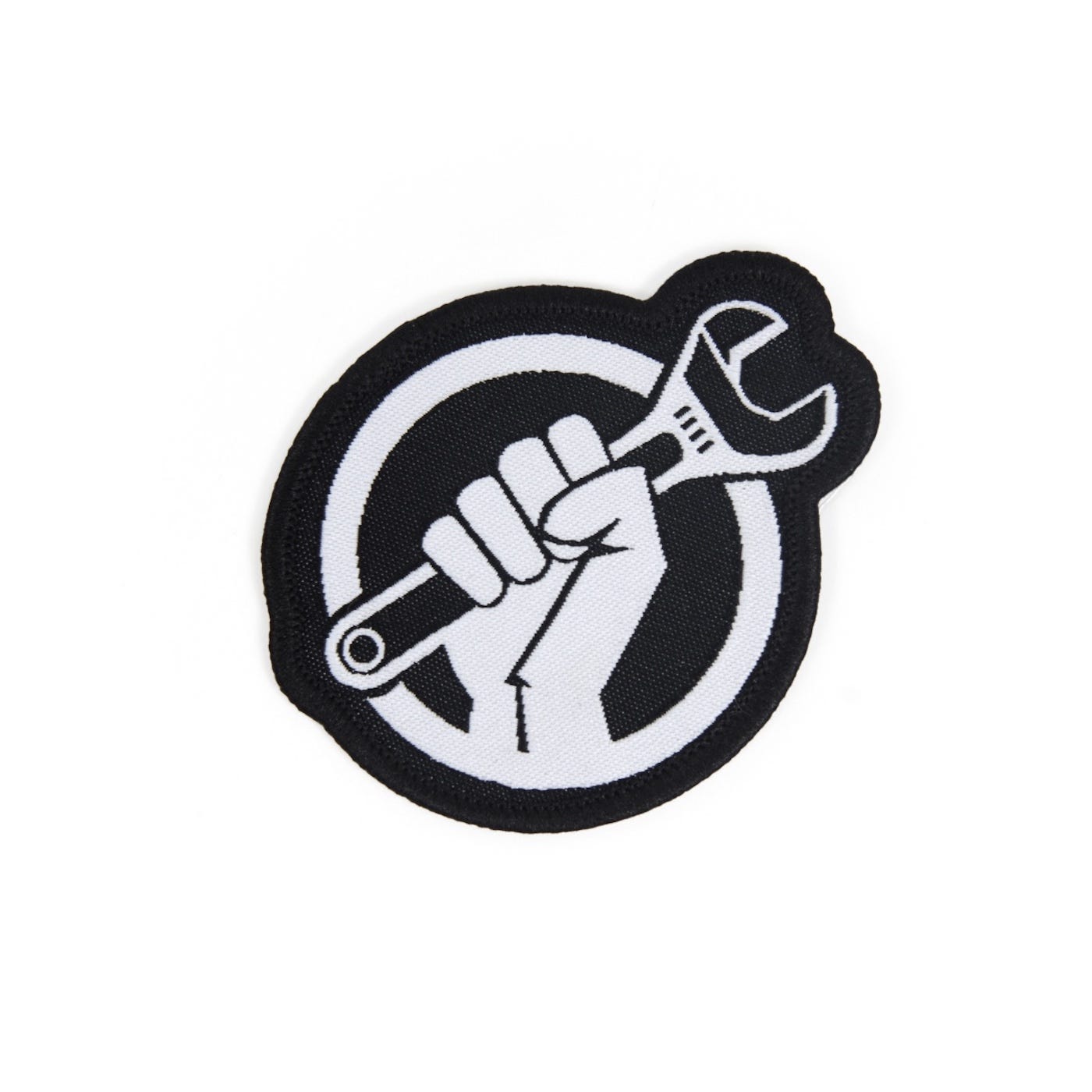California Legislature Passes Electronics Right To Repair
The Golden State's legislature became the latest to pass an electronics right to repair bill. Also: a designer breathes new life into discarded chairs and Google agrees to 10 yr Chromebook support.
California Legislature Passes Right To Repair Act
California - aka “The Golden State”; aka “the world’s fifth (fourth?) largest economy” became the latest U.S. state whose legislature has passed broad electronics right to repair legislation. On Tuesday, the California Assembly voted 65-1 to pass Senate Bill 244, the Right to Repair Act. That was followed by a 39-1 vote in the California Senate, officially sending the bill to the desk of Governor Gavin Newsom, who is expected to sign it.
“I’m grateful to my colleagues in the Legislature, the advocates fueling this movement, and the manufacturers that have come along with us to support Californians’ Right to Repair,” said state Senator Susan Eggman. “This is a common sense bill that will help small repair shops, give choice to consumers, and protect the environment.”
Getting the bill through California’s legislature was no easy task. Right to repair legislation has been proposed for the past five years, and similar bills died in the Senate Appropriations Committee the last two years in the face of intense lobbying by Silicon Valley firms, including Apple Computer, as well as associations representing industries like electronic gaming, telecommunications, agricultural equipment, medical devices and home appliances.

However, this year’s vote followed successful efforts to pass broad electronics right to repair laws in New York and Minnesota as well as an agricultural right to repair bill that was signed into law in Colorado. It also saw key opponents of right to repair legislation - notably Apple - reverse course and support passage of the bill.
“The era of manufacturers’ repair monopolies is ending, as well it should be,” said Kyle Wiens, iFixit CEO. “Accessible, affordable, widely available repair benefits everyone.”
The California bill has some advantages over the legislation passed in Minnesota and New York - partly due to California’s already strong consumer protection laws. Under the terms of the SB 244, manufacturers are mandated to keep repair materials, ranging from parts and tools to software and documentation, available for extended periods post-production: 3 years for products within the $50-$99.99 price bracket, and 7 years for those priced $100 or above, noted Elizabeth Chamberlain of iFixit. The bill applies to electronic and appliance products made and sold after July 1, 2021.
Together with the other two states that have passed electronics right to repair bills, passage in California means that states representing roughly 25% of US GDP have enshrined a right to repair electronics into law, noted Paul Roberts the founder of Secure Repairs (and EIC at Fight to Repair.)
“As longtime advocates for right to repair laws, we are heartened to see that California legislators looked past the hand-waving about cyber risk and data privacy, voting overwhelmingly to pass this critical consumer protection that will have an outsized impact on both Californian’s wallets and their environment. This is a great day for the great state of California.”
Salvaging Chairs Through Repair
Have a chair that breaks? There are countless more to replace them. We have cycled through them since ancient Chinese nomads (likely) created them—breaking, repairing and replacing them ever since.
But Amsterdam-based designer Ollee Means is hoping to end that cycle: using design and restoration to subvert our lack of love for chairs: rescuing and revitalizing a dozen mid-century Danish dining chairs that were bound to turn into garbage
Repair alchemy
You may have heard of Ollee Means before, he’s been on our podcast for his creation of the guilder—a place to where people can exchanges of skills, services, or materials instead of money which are then documented through photographs.
His latest project "12 Chairs" scooped these seats from an early death and restored them by using a bar that had been closed in Amsterdam as his workshop.
The project points to the flaws in our current modes of consumption, starting with one of the simplest objects we rely on. By centering sustainability and pointing to the labor needed to maintain objects and ensure their materials are used to their fullest, Means highlights the changes that will need to be made if we are to become a more “sustainable” society.
"The chairs make a compelling argument for the importance of repair and sustainability in modern design. ‘It's like solving puzzles that you didn't create,’ describes Ollee, referring to challenges like inconsistent construction techniques in the objects."
Taking the labor needed to restore them into account, Means’ chairs likely would have retailed around €1000 per chair. Instead, he priced them at €195. That’s still more than comparable chairs that can be found with a simple Amazon.com search. But Means points to the other (hidden) costs of the “throw away and replace” model. Among them: a lack of connection with the objects in our lives and the violent downstream effects of waste and overconsumption.
Means work is pointing to an optimistic future—one where care and respect both the labor and materials to produce the objects we rely on. And while a chair might be a simple start, the lessons we can learn are equally as straightforward.
Other News
Google extends support for Chromebooks. Google said it is extending Chromebook support to include 10 years of automatic updates for Chromebooks including for older models dating back to 2019, to address concerns about their limited lifespan. Google will also implement sustainability measures such as adaptive charging and using recycled materials, aiming to enhance the devices' longevity and reduce electronic waste. The decision follows calls for Google to change its policies from the U.S. Public Interest Research Group (PIRG) and others. PIRG’s Education Fund published a report, Chromebook Churn, that concluded that doubling the life of Chromebooks sold in just 2020 could cut emissions equivalent to taking 900,000 cars off the road for a year, and could result in $1.8 billion dollars in savings for schools. Following that study, a coalition of nonprofits, parents, and teachers wrote a letter to Google calling for longer-lasting laptops. “Google’s decision is a victory for the parents, teachers, students and environmentalists who asked to extend the life of Chromebooks in response to our Chromebook Churn report, said Lucas Rockett Gutterman, director of PIRG’s Designed to Last campaign in a written statement. “With a lifespan of 10 years, fewer working laptops will be disposed of because they’ve reached their “death date.” Google and other tech companies should continue to innovate ways to commit to a circular economy and stop pressuring us to replace our phones and laptops.”
California is also ramping up to approve a wheelchair right to repair. The In the immediate aftermath of its passage of comprehensive electronics right to repair, the California Assembly moved ahead with more repair-focused legislation. On Wednesday, it approved legislation proposed by state Senator Bill Dodd that grants wheelchair users in California the right to repair their equipment promptly and preventing manufacturer-imposed delays. SB 271 ensures the right to repair for California wheelchair users. The Assembly unanimously approved SB 271, and it awaits a concurrence vote by the California Senate before being sent to Gov. Gavin Newsom's desk to be signed into law.
In her new book, "Why Don’t I Have Anything to Wear?", Andrea Cheong discusses the impact of fashion on our self-worth, highlighting how society's focus on appearance affects women more than men. She encourages individuals to use clothing as a means of self-expression rather than seeking external validation through fashion. Cheong emphasizes the conflicting emotions fashion can evoke, and advocates for a shift away from defining ourselves by what we wear and toward making mindful clothing choices.

Source: GoodOnYou A global shortage of technicians for electric vehicles (EVs) is raising concerns about increased repair and warranty costs, potentially affecting efforts to reduce vehicle carbon emissions; independent repair shops are seen as vital for making EVs affordable but are reluctant to invest in training and equipment due to the risks involved, including electrocution and EV fires, leaving consumers with higher bills and longer repair times.
The London Design Festival is next week, with a series focused on circular economy. The Circular Design Series aims to explore sustainable solutions for the massive material waste problem we currently phase, emphasizing the downstream effects that every material choice in product designs have.
Brian Chen of the New York Times has written about how to prepare yourself for the iPhone’s shift to USB-C. Among his suggestions: invest in reputable brands like Anker, Belkin, and Amazon Basics for USB-C cables. Also: use caution when plugging USB-C cables in. Avoid unknown or unregulated power sources to prevent damage.
UK-based footwear brand Vivobarefoot has partnered with textile-to-textile recycling company Circ to develop circular design solutions for footwear, aiming to create shoe uppers made entirely of chemically recyclable polyester without using any virgin materials, with their first joint product, the Vivobarefoot Primus Circular, set to launch in fall 2024; the collaboration seeks to address the limitations of current footwear recycling methods, which often lead to materials that cannot be recycled in the future, and focuses on sustainable, circular design from the outset.
Renewable energy sources like wind and solar still require raw materials such as lithium, cobalt, and copper, and the concept of "urban mining" is emerging as a solution to recycle and reuse these materials from discarded electronics, as the demand for these metals escalates and prices rise, prompting the mining industry to invest in urban mining facilities to extract reusable raw materials and potentially profit from recycling efforts in the green transition.
The ability to store and access energy has been critical in shaping societies. From agriculture, to wood, to coal, to oil, each transition has marked a new way for humans to interact with the world around them. A new podcast episode from The Great Simplification explores what would it mean for economic growth if we no longer have access to these storable energies?







